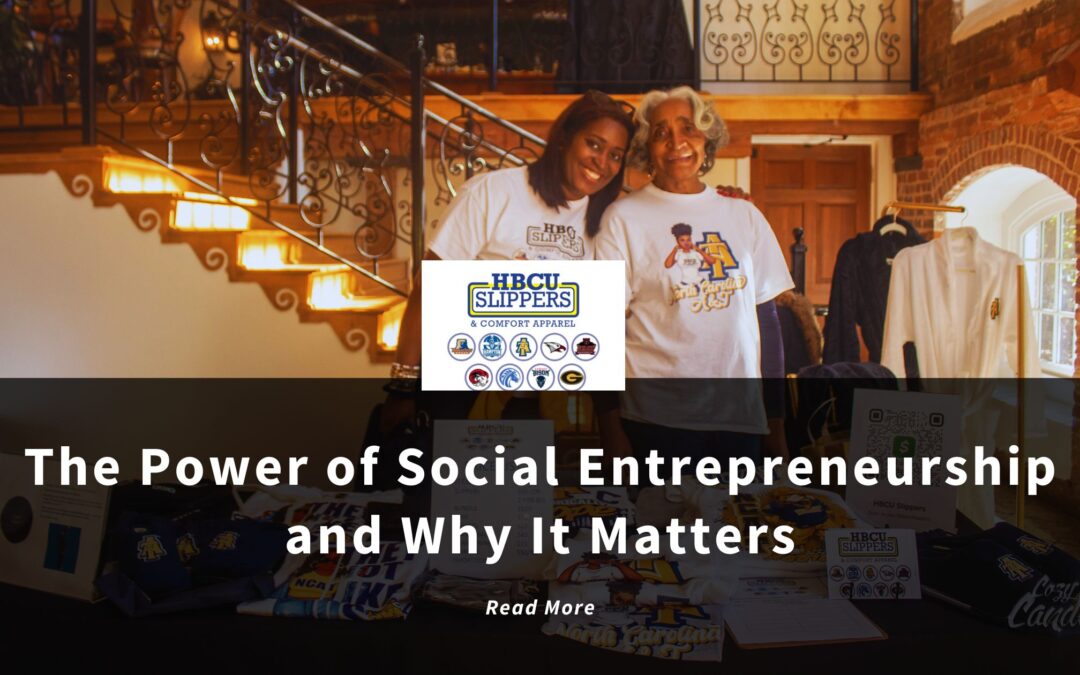- Social entrepreneurship blends business with meaningful impact by addressing systemic issues through purpose-driven innovation.
- This model responds to the growing demand for ethical, community-focused brands from both consumers and employees.
- HBCU Slippers & Comfort Apparel exemplifies social entrepreneurship by offering comfortwear that uplifts and honors the HBCU community.
In a world where challenges seem endless—climate change, poverty, systemic inequality, and health disparities—many of us ask the same quiet question: What can I do to help? It’s a powerful question because behind it lies both concern and courage. And at the intersection of that concern and courage is social entrepreneurship—a way of doing business that puts people and the planet right alongside profit.
Social entrepreneurship matters deeply, not only because of the good it brings but because of the possibility it unlocks. It proves that you don’t need to separate business from compassion, or success from service. Instead, you can build something that sustains both your community and your company, something that honors your values while supporting your livelihood.
Let’s walk through what makes social entrepreneurship so meaningful, why it’s growing, and how it’s quietly rewriting the rules of business in ways that prioritize kindness, equity, and lasting impact.
What Is Social Entrepreneurship?
Social entrepreneurship is the practice of building businesses with the primary goal of addressing social, environmental, or community-based issues. Unlike traditional business models that focus solely on profit, social entrepreneurs lead with purpose. They build companies to heal something that’s broken, lift up those who have been left out, or solve problems that others overlook.
That might mean designing affordable healthcare solutions for low-income families. It could mean launching a zero-waste grocery store, hiring people who face employment barriers, or developing learning platforms for underserved students. In every case, the core idea is the same: create something that not only makes money but makes a difference.
What sets social entrepreneurs apart isn’t just that they care—it’s that they act. They see a need and step into it, often with limited resources but limitless hope. They believe that businesses can do more than sell. It can serve. And when it does, everyone benefits.
Why It Matters: Business With a Bigger Heart
The significance of social entrepreneurship goes beyond goodwill—it reflects a changing mindset in our society. We’re beginning to recognize that unchecked capitalism has consequences and that measuring success solely by financial gain leaves a lot of people behind.
Social entrepreneurship responds to that imbalance. It asks businesses to grow more slowly, more intentionally, and with greater respect for the people they touch. It invites us to widen the lens, to look not just at quarterly earnings but at long-term well-being.
The impact isn’t abstract. It’s deeply human. Social enterprises often work closest to the pain, offering fresh starts to people coming out of incarceration, food access to neighborhoods in need, or job training to youth at risk. These are lives changed, day by day, not by charity, but by dignity and opportunity.
And in a time when so many feel forgotten, ignored, or underestimated, that kind of work matters more than ever.
A Shift in Priorities
Younger generations, especially Millennials and Gen Z, are pushing for change with their wallets and voices. They want to support brands that reflect their values. They’re asking questions like: Who made this product? Were they treated fairly? Does this company care about the climate? Is it giving back to the community?
This shift in consumer consciousness is driving businesses to rethink not just their marketing, but their mission. Social enterprises were born from this shift, and they thrive because of it. Their transparency, authenticity, and heart resonate in ways that traditional marketing strategies can’t match.
And the desire for purpose isn’t limited to consumers. Employees, too, are seeking meaning in their work. Many professionals now look for employers whose values align with their own. They want to be part of something that feels bigger than a paycheck. Social entrepreneurship provides that connection.
In this way, the movement toward socially driven business models isn’t just kind—it’s strategic. It creates stronger brands, more loyal customers, and more fulfilled teams.
Social Entrepreneurs Are Systems Thinkers
At its best, social entrepreneurship doesn’t just address symptoms—it works to transform systems. It looks upstream and asks, Why does this problem exist in the first place? Then it builds solutions at the root.
That might mean tackling educational inequality not just by providing scholarships, but by reimagining access to learning altogether. It could involve challenging fast fashion by creating clothing from recycled materials or paying living wages to garment workers.
These businesses often run lean, face steep hurdles, and take longer to scale, but their impact can be profound. Social entrepreneurs don’t wait for permission. They take responsibility. They build from the ground up, often with deep humility, because they know the people they serve deserve more than band-aid solutions. They deserve better systems.
And when those better systems start to take shape, everyone, not just the direct beneficiaries, wins.

The Emotional Fuel Behind the Work
Social entrepreneurship is emotionally demanding work. It’s born out of empathy, and that empathy doesn’t switch off at the end of the day. Many social entrepreneurs are deeply connected to the problems they’re solving because they’ve lived with them or seen them up close in their communities.
That proximity can be a powerful motivator. It can also be exhausting. Running a business is hard enough. Doing it while carrying the weight of social responsibility, personal connection, and community expectations adds an extra layer of intensity.
And yet, despite the stress, many social entrepreneurs will tell you they wouldn’t trade it for anything. Because at the end of the day, the rewards go beyond revenue. They get to witness transformation—not just of lives, but of systems, mindsets, and futures.
They know their work matters. And that knowledge keeps them going, even when the path is steep.
We Need More Than “Nice Ideas”—We Need Support
As powerful as social entrepreneurship is, it can’t flourish in isolation. These businesses need more than praise. They need resources, funding, policy support, and public understanding.
Far too many brilliant ideas fail not because they’re unworthy, but because they’re underfunded. Social enterprises often struggle to attract traditional investors who expect rapid growth and high returns. And while impact investing is growing, it’s still out of reach for many early-stage ventures.
That’s where community support comes in. Each of us has a role to play in nurturing this ecosystem. Whether it’s choosing to buy from a social enterprise, offering professional expertise, sharing their stories, or advocating for inclusive economic policies, we can help create the conditions in which these businesses thrive.
Because when social entrepreneurs succeed, it isn’t just a personal win. It’s a collective one.
What Social Entrepreneurship Teaches Us About Hope
Social entrepreneurship offers a gentle but firm reminder: We are not powerless. We are not stuck. We are capable of imagining and building something better.
These businesses are proof of what’s possible when compassion is paired with creativity and when action follows empathy. They don’t pretend to have all the answers. But they show us what it means to ask the right questions and keep moving forward, even when the road isn’t easy.
Social entrepreneurship is an act of faith—in people, in justice, in the idea that business can serve the soul as well as the bottom line. And perhaps that’s why it resonates so deeply. It gives us something to believe in, something to build with, and something to belong to.
A More Caring Economy Is Within Reach
If social entrepreneurship has taught us anything, it’s that business doesn’t have to be cold or cutthroat. It can be a space of care. It can reflect the values we hold dear—like equity, sustainability, and love for our communities.
That kind of economy isn’t just wishful thinking. It’s already here, in thousands of small and growing enterprises around the world. Each one is a quiet revolution, a tender refusal to accept that profit must come at the expense of people.
The more we support these efforts, the more we accelerate the shift. Not just toward better business practices, but toward a more connected, compassionate world.
You Don’t Have to Start a Business to Be Part of the Movement
You may never launch a social enterprise, and that’s okay. But you’re still part of the story. Every time you choose to buy ethically, recommend a purpose-driven brand, or simply talk to others about the power of socially responsible business, you move the needle.
You help shift the culture. You help validate the idea that kindness belongs in the boardroom. You help nurture a future where business is about more than power—it’s about people.
And in a time when so many are asking what they can do to help, these everyday choices are an answer. A quiet, steady, hopeful answer.
Wrap yourself in pride and comfort with HBCU Slippers & Comfort Apparel—where every stitch celebrates legacy. Shop the only comfortwear line made just for the HBCU family.

